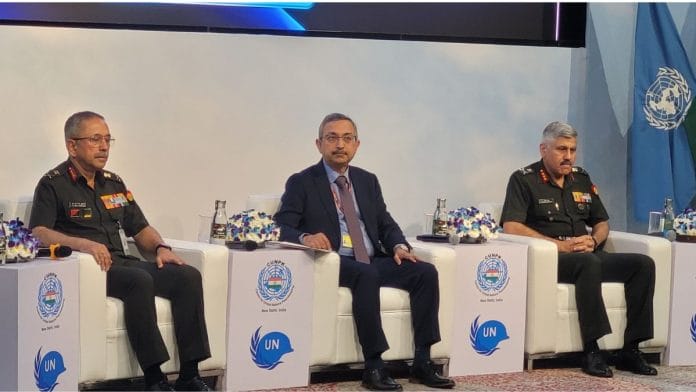New Delhi: Deputy Chief of Army Staff (DCOAS) Lieutenant General Rakesh Kapoor has said that social media has played a significant role in fuelling global conflicts. At a conference here Monday, he remarked that widely circulating misinformation was exacerbating tensions between conflicting parties and nations.
Lt Gen Kapoor was speaking at a conference titled ‘Women in Peacekeeping: A Global South Perspective,’ organised by the Ministry of External Affairs (MEA) in collaboration with the Ministry of Defence (MoD). The two-day event, being held on 24 and 25 February at Manekshaw Centre in New Delhi, is a first-of-its-kind conference in India.
The conference has brought together women peacekeepers from 35 countries who have over 15 years of service experience. The objective is to provide a platform for women from the Global South to discuss contemporary challenges and issues related to peacekeeping.
“International humanitarian law is facing numerous challenges, and ensuring the security of peacekeepers has itself become a growing concern. Women, in particular, play a crucial role in this regard,” said Lt Gen Kapoor.
He further stated that, to enhance mental well-being in mission areas, India has deployed female psychological counsellors who engage with women and children in conflict zones. Additionally, Indian forces incorporate traditional practices such as yoga in their missions, with trained instructors helping people improve their mental health and find alternative ways to manage stress.
According to Lt Gen Kapoor, 20 percent of India’s military observers and staff officers deployed in peacekeeping missions are women. While their representation in contingents remains low due to the limited number of women in the armed forces, he assured that this proportion would increase as capacity grows.
He also said that all Indian peacekeeping contingents include female engagement teams. Notably, India was the first country to deploy an all-women peacekeeping contingent in Liberia in 2007.
From a peacekeeping standpoint, conflicts are becoming increasingly complex due to external influences, said Lt Gen Kapoor. “Wherever conflicts arise, warring factions seek control over key areas, which are often densely populated urban regions. This leads to large-scale displacement, triggering migration, which in turn becomes another source of conflict.”
He emphasised that women peacekeepers have better access to women and children in host nations, enabling them to gain deeper insights into their struggles. “Women help build trust and confidence in local communities,” he said, adding that this trust allows them to gather crucial information, which can be used for preventive measures and fostering peace.
Highlighting the broader impact of female peacekeepers, he remarked, “Women, by their mere presence, serve as role models who inspire and empower local women to take on roles in security and governance.” He also pointed out that women are often more skilled in negotiation and mediation, helping resolve conflicts effectively.
The participation of women, he said, enhances the operational effectiveness of peacekeeping missions by bringing diverse perspectives, improving mission performance, and fostering credibility.
India remains one of the largest troop-contributing nations to UN peacekeeping efforts, with nearly 300,000 Indian peacekeepers having served under the UN banner. Currently, over 5,000 Indian troops are deployed across nine out of 11 active UN peacekeeping missions.
Ever since India first deployed troops under the UN banner in conflict-ridden areas, the country has suffered the loss of nearly 180 Indian peacekeepers in the line of duty.
(Edited by Radifah Kabir)
Also Read: India made Sniper rifle trumps American in police commando competition






